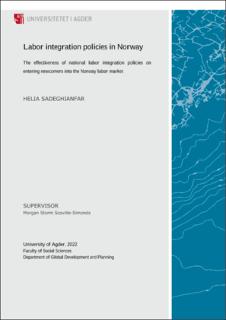| dc.description.abstract | Worldwide, millions of refugees and migrants are crossing borders, seeking to flee
economic, social, cultural, and political inequality and violence, and looking for a better
life. As the world continues to face challenges of increased migration rates, implemented
and strengthening integration programs, especially labor integration programs become vital
for the host countries. Notwithstanding considerable research on the topic of refugee labor
integration, the literature indicates that more research is needed, particularly in
immigration-popular destinations countries, such as Norway. Hence, this study aims to
provide a comprehensive understanding of the effectiveness of labor integration programs
in Norway based on the perspectives and experiences of refugees and immigrants who
attend the national integration programs. To achieve this aim, twelve semi-structured
interviews with ‘newcomers’ from non-western counties, as the main group of immigrants
and refugees in Norway, were conducted. The results of the findings were transcribed and
analyzed using a mixed technique of coding and thematic analysis.
This study found that the effectiveness of integration programs in entering
newcomers to the labor market is perceived to be largely dependent on their human and
social capital. While the effectiveness of integration programs for newcomers with high
education was considered less than for those who immigrate with less education and skill,
most participants believed that the introduction programme offered by the Norwegian
the government had a positive impact on their labor integration and job-seeking process.
Among the effective factors in the labor integration process, the importance of linguistic
skills was highlighted by all participants. Nevertheless, social capital - regarding social
networks and strong ties/bonds between people - also is seen to be an important factor in
determining the success of immigrants in the job market which is suggested to be included
in the government integration programs. | |
